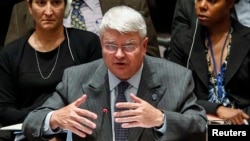The U.N.’s head of peacekeeping, Hervé Ladsous, urged the Security Council on Wednesday to impose a comprehensive arms embargo on both the government and opposition in South Sudan.
On the eve of the world’s youngest country’s fourth birthday, Ladsous told a small group of reporters that the situation on the ground was “absolutely appalling.” He cited the conflict that erupted in December 2013 between President Salva Kiir and his deputy turned political rival, Riek Machar, which has killed thousands and displaced more than 2 million people.
More than 150,000 people are being sheltered in six U.N. protection sites. The United Nations has a force of about 12,000 peacekeepers in the country.
Sanctions Imposed
Last week, the Security Council finally made good on a threat to impose sanctions against spoilers to the political process. It imposed travel bans and asset freezes on three generals loyal to Kiir and three from Machar’s opposition camp.
But Ladsous said it should not stop there. The peacekeeping chief said he would ask Security Council members in a private session Wednesday afternoon for an arms embargo on both parties.
“What really should be looked at is the possibility of more sanctions towards more leaders,” he said. “I do think that there should be a decision about an arms embargo, because it is really completely questionable that the very meager resources that the country has go into buying more weapons.”
The United States, China and Russia have all previously resisted the idea of an embargo. Human rights groups have increased international pressure for one, urging the Obama administration, in particular, to support one.
Failed Leadership
Ladsous criticized Kiir and Machar, saying he could not understand how two leaders who had such stature could show such little regard for the welfare of their population.
Samantha Power, the United States' U.N. ambassador, told VOA that the situation in South Sudan was the result of “the complete and utter failure of political leadership” by the government and the opposition. She said the situation was an “outrage” and was “going in the wrong direction.”
Last week, the U.N. Mission in South Sudan (UNMISS) released a report on the effect of the fighting on human rights in the country. It reported horrific abuses in the recent upsurge in fighting, including rampant killing, rape, abductions, looting, arson and displacement, as well as a new level of brutality, which included shooting women after gang-raping them and burning people alive in their homes.




